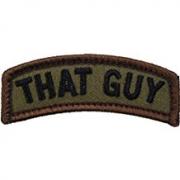my support hand is reasonably far forward on the handguard so when I switch the stock to the support side shoulder my range of motion is greatly reduced, bringing my support hand back alleviates that and gives me amore ability to move how i want to. that being said I use this technique pretty infrequently, when it is put in use I find it to be faster than switching to a true support hand grip. I will also say that I absolutely feel a difference in the controllability of the rifle when using a magwell grip compared to a more compressed handguard grip.





 Reply With Quote
Reply With Quote



